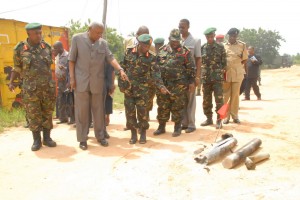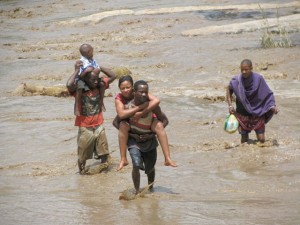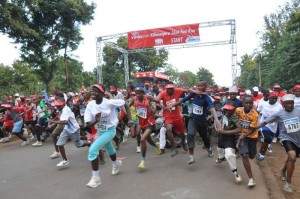Compiled by Donovan Mc Grath
Shumba evokes cultural revival in Tanzania (Mmegi, Botswana, January 17th, 2011)
This article followed the tour of Botswana traditional musician Shumba Ratshega in Tanzania. A Tanzanian official noted that unlike Tanzanian traditional dances, the dance style known as Makhirikhiri was well promoted even before the group arrived in the country. “This is a testimony that traditional dances, which could earn people a living are still unexploited in the country.” He asked Tanzanians to appreciate their own traditional music saying, “it is sad to see that it is difficult to come across a DVD, CD and audio tapes of Tanzania traditional music . . . To have our traditional groups promoted we must deliberately see that we record them in DVDs, CDs and audio tapes so that they can be accessed internationally,” he said, adding, “Tanzania has more than 120 tribes endowed with rich folk dances, which could make people earn the much-needed foreign exchange.” Ngala challenged traditional dance groups to wake up, saying, “Tanzanians must not wait for foreign music groups to come into the country and remind us about the beauty of our dances as we are doing now with the Makhirikhiri.”
Anne Makinda in control of Tanzania’s Bunge (The East African, December 20-26, 2010)
Extract: ‘Anne Makinda, Tanzania’s new Speaker of parliament is not new to leadership. She was involved in politics as early as in primary school where she was an active member of the youth wing of the Tanganyika African National Union (Tanu) … The 61-year-old Njombe South MP (Chama cha Mapinduzi) garnered 265 votes in the race for House Speaker … defeating the opposition candidate Mabere Marando, who got 53 votes of the 327 ballots … Makinda [is] the first woman Speaker in Tanzania … Makinda has promised to mould the legislature into an inclusive, strong and independent institution. … President Jakaya Kikwete was among the first to congratulate Makinda on her election …’
We want more say in this Union, Zanzibar tells Tanzania govt (The East African, February 14-20, 2011)
Extract: ‘… Zanizibar argues that there are unfair fiscal and monetary agreements that kill its economy. For example, it points out that there is double taxation of goods imported into the Tanzanian Mainland from Zanzibar. Petroleum and natural gas, which are likely to be discovered off the islands, have been included in the list of Union matters. However, gold, diamonds and tanzanite that are found in Tanzania Mainland are not classified as such. … With regard to foreign aid they pointed out that although it is solicited and received in the name of the United Republic, Zanzibar receives little, or nothing in respect of non- Union matters such as agriculture. It is the mainland that decides on behalf of Zanzibar how much it should get. Yet Zanzibar cannot shop for foreign aid for itself. … The bone of contention is that the Union deals with Union and non-Union matters lumped together…’
The sinking of the Konigsberg recalled
Extract: ‘An episode of East African history was recalled in December 2010 when a group of medals awarded to a Royal Navy veteran were sold at a London auction. Robert Calvert … joined the navy as a stoker in 1910. At the outbreak of the 1914-18 War he was serving on HMS Pyramus, a light cruiser of 2000 tons. … In January 1915 it joined the naval force off German East Africa blockading the German battle cruiser Konigsberb in the Rufiji Delta. .. In the citation for his British Empire Medal in 1945, [Calvert] was described as “utterly reliable and ruthlessly efficient.” His medals sold for £330. By coincidence another group of medals at the same sale also related to German East Africa.
They were awarded to Private Sanjani of the First Battalion of the Kings African Rifles … Sanjani’s medals sold for a modest £45.
Thanks to John Sankey for this item (with acknowledgements to Messrs. Dix Noonan Webb auctioneers).
Notes from an Island (BBC Focus On Africa, April-June 2011)
‘Zanzibar’s rich music heritage is evolving but traditional music continues to pulse through people’s veins. Zahra Moloo reports’
Extract: ‘… Crowds of youths from the village of Jambiani in the east of Nguja, Zanzibar’s largest island, have gathered to hear [Bi Kidude] the indisputable queen of two traditional East African music forms known as taarab and unyago… Bi Kidude starts her performance with some Swahili verses of another taarab legend, the late Siti Binti Saad who has been described as a Zanzibari version of Egypt’s Umm Kulthum. . . As the last of the three to survive, Bi Kidude, who is thought to be around 100 years old, has travelled the world to perform … Yet despite its rich cultural history, traditional taarab music appears to be in decline. … Increasingly Zanzibar’s youth is drawn to the globalised culture of hiphop and in particular to bongo flava – Tanzania’s answer to American hip-hop. At the same time Zanzibar has developed its own hip-hop style known as zanj flava. . . But despite the growing popularity of hip-hop, taarab stills remain (sic) in the blood of the people …’
You can now register your firm in 3 days only (The East African, December 20-26, 2010)
Extract: ‘Investors will now register their businesses in Tanzania in three days instead of 90 days… Until recently, one had to travel to Business Registration Licensing Agency (Brela) offices in Dar es Salaam . . . but, now with Corporate and Property Data Profiling systems (CDP and PDP), a software by Mawalla Corporate Services, one can easily register a company online… A total of 80,066 companies have been registered in Tanzania since 1930s, but few pay taxes because there is no official record of their existence. … Brela chief executive Estariano Mahingila [said] “The [CDP and PDP] software can boost Tanzania’s tax base and revenue significantly and additional funds will become available for building infrastructure and taking Tanzanians from a dire poverty to the promised land of prosperity” …’
AfDB injects more funds into small traders’ loan facility (The East African, December 20-26, 2010)
Extract: ‘More than 800,000 people mostly women will benefit from a TShs 44 billion ($30 million) financing grant by the Tanzanian government and the African Development Bank (AfDB).’
Region ready to sing its own song as new anthem is unveiled (The East African, December 27, 2010-January 2, 2011)
Extract: ‘After years of searching for a regional anthem and spending some $60,000, the East African Community can finally dance to its own tune. . . “The final acceptance of the EAC Anthem is a major legacy of my tenure as Secretary General, as it will contribute greatly to the struggle of capturing the imaginations of East Africans about the lofty goals of the EAC; how to galvanise their attitudes and sensibilities around what the EAC stands for, and re-branding the EAC,” said Juma Mwapachu . . .’
You can broadcast this from the rooftops: The Harry Potters are back in charge (The East African, December 27, 2010 – January 2, 2011)
Extract: ‘… The headquarters of [Tanzania Broadcasting Corporation] were for a long time situated on Pugu Road, now Julius Nyerere Road. The offices were rundown, bleak and untidy. But now TBC has acquired new and shiny buildings in the Mikocheni area. … It is here that many of us hoped that this old organisation would gradually metamorphose from a state mouthpiece into a public broadcaster. … This is crucial, especially under the new multiparty dispensation wherein diverse political views must be aired. … So, when some five years ago, the government hired Tido Mhando, a veteran journalist who had cut his radio broadcasting teeth in the old outfit before going on to work for the BBC, hopes for that metamorphosis were given fillip. … In very short order, Mr Mhando showed his mettle: He supervised the modernisation of the studios; he hired new and sharp hands; he devised new and exciting programmes; he insisted on professionalism and discouraged political cronyism; he gave respectable space to opposition politicians; he presented excellent, fairly balanced newscasts. … But Mr Mhando’s political bosses were not impressed, especially when TBC went on to screen pre-election political debates after the ruling party had ordered its candidates not to participate. … Pressure began to mount on Mr Mhando as agents of the government breathed down his neck . … His mistake was that he buckled … he was summoned to the office of a Ministry of Information top honcho and told to go back immediately and hand over his office to an acting director . … With a little modernisation and the hiring of Mr Mhando, some of us thought the Harry Potters had lost out, but the joke is strictly on us…’
Kiswahili’s future lies in borrowing from English (The East African, January 17-23, 2011)
‘The future of the region’s lingua franca lies in avoiding the pitfalls that befell the French language.’
Extract: ‘… Despite the problems faced in the mastery of Kiswahili, the spread of the language in the region is undeniable: more and more people are speaking Kiswahili in Uganda, Rwanda and recently Southern Sudan. Charles Omondi … writes that Southern Sudan could soon be the next major frontier for the expansion of the language … “coming at a time when no official effort has been made by the government to pro- mote the language.” The rise and rise of Tanzanian Bongo flava music in the region has undoubtedly contributed to the spread of Kiswahili, particularly in Uganda, where it had long been considered the language of soldiers, criminals and refugees. The language’s popularity surged after the Ugandan artiste Jose Chameleone recorded his biggest hits to date in Kiswahili – Jamila and Mama Mia. … English easily absorbs foreign words without much fuss – many words are borrowed from European languages such as Latin, German and Spanish; even Hindi (shampoo, monsoon), Japanese (karaoke, tsunami) and Kiswahili itself (safari, mamba). … French, on the other hand, is much more insular than English . … To maintain its relevance and life span, therefore, Kiswahili should borrow a leaf from English and be less jittery about the influence of local slang, and adulterations such as Sheng [street slang spoken in Kenya]…’
Jane: Why the queen of the jungle is a role model for all (The Times Eureka supplement, January 2011)
This is a very interesting article by Jo Harvey, briefly reflecting on how Jane Goodall began her pioneering research on the behaviour of chimpanzees in Tanzania, which serves as an inspiration to new generations of primatologists. Goodall was mentored by the famous palaeontologist Louis Leakey.
Extract: ‘Goodall … recognises that her work has inspired many women. … Goodall’s work and that of two other female pioneers in primatology, Dian Fossey and Biruté Galdikas, was made possible by the example of Leakey. … Leakey was convinced that the answers to the mysteries surrounding the origins of Man lay in the field of primatology, and he was responsible for inspiring and finding sponsorship for the landmark field studies conducted by Goodall, Fossey and Galdikas. Leakey thought that the attributes that made a good field scientist were innate in women … they were patient, they were better able to understand an animal’s desires by observing social non-verbal cues and they were less aggressive than men … Goodall was the first of “Leakey’s angels”… In 1960, after the 26-year-old Goodall had assisted on a fossil dig at Oluvai (sic) Gorge in Tanzania, she was sent by her mentor to study chimpanzees in the wild.’ Charlotte Uhlenbroek is among the next generation of female primatologists who are inspired by Jane Goodall. Uhlenbroek’s interest in primatology came after her father took his family on holiday to Gombe National Park in Tanzania to meet Jane Goodall.
A Road to Somewhere (BBC Focus On Africa, January-March 2011) ‘A scheme in Tanzania is successfully getting children off the streets and into work, and encouraging tourism at the same time…’
Extract: ‘… nestled between the peaks of Mount Meru and Mount Kilimanjaro … Kiboko lodge … has been built, maintained and is now staffed by former street children. … All have been through the Watoto Foundation: a Tanzanian organisation that works with street boys.’ After primary education at the Watoto residential centre, many of the boys go on to gain valuable trade skills in ‘Makumira – a vocational training centre run by the Watoto Foundation, just outside Arusha. … The centre offers mechanics, bicycle repair, welding, carpentry, furniture making, animal husbandry and gardening skills … the end product of which is there for all to see in Kiboko Lodge. … The decision to build a lodge entirely staffed by former street children was entirely practical. Watoto Foundation’s founder, Noud Van Hout, realised there was a gap in the market for budget, quality accommodation for tourists.’
Oil exploration firms now flocking to Tanzania (The East African, January 31 – February 6, 2011)
‘At least 17 companies involved in oil and gas exploration have signed 23 agreements with the government.’
Extract: ‘Multinational Ophir Energy Company has entered into an agreement with Tanzania to commercialise natural gas in Mtwara. The agreement follows the acquisition of 60 per cent of Ophir’s interest in Tanzania by British Gas Group (BGG)…’ The agreements include such companies as: Shell International, Maurel and Prom, Dominion Oil and Gas, Ndovu Resources, Petrodel, Tullow Oil, Beach Petroleum, Tower Resources Plc, Ansco Petroleum (T) Ltd, Statoil, Petrobras Tanzania, Songo Songo Gas Field, Artumas Group Inc, Key Petroleum, Hydrotanz, and Ras Al Khaiman Gas Commision.
Africa’s Gold Standards (BBC Focus On Africa, January – March 2011) ‘The relationship between local communities and large mining multinationals operating in Africa is tenuous at best, writes Zahra Moloo.’ Extract: ‘In May 2009, after a night of heavy rainfall, the Tigithe river in the north of Tanzania, turned a strange shade of red. The river, the water source for thousands of people, had allegedly been contaminated by a leaking storage pond at the nearby North Mara mine, operated by the African subsidiary of one of the world’s largest gold companies, Canada’s Barrick Gold. Testing by the company found water too acidic for fish to survive and well short of Tanzania’s drinking water standards. … Despite numerous appeals by the community to shut down the mine, in July 2010 the Tanzanian government declared the river free of pollution. … [Such] controversies have not deterred the Tanzanian government from continuing to grant concessions to foreign multinationals and expanding the country’s mining sector, including its unexploited uranium deposits…’
Five Star hotel may threaten Zanzibar’s Heritage Site status (The East African, January 24 – 30, 2011)
‘Unesco alarmed by plans to remodel old cultural house on Forodhani seafront – ruining the town’s low-rise skyline and neoclassical architecture.’ Extract: ‘Mambo Msiige, an old cultural building, is to be redeveloped by Kempinski at Stone Town. … Unesco World Heritage Centre has warned that this could see one of the most popular tourist attractions, the Zanzibar Islands, struck off the prestigious list of World Heritage sites. … If de-listed, Zanzibar would become the third site to suffer such a fate since the creation of the World Heritage Sites list in 1972. … Some officials say the loss will damage both Stone Town’s reputation and its tourism revenues…’
Deforestation (The East African, March 21, 2011)
According to this article some 8 million hectares of forest was lost in Tanzania between 1990 and 2010, over 19% of the forest cover. Forest area per person declined from 6.3 hectares per person in 1961 to about 0.8 hectares presently (although this still far exceeds the UK figure of 0.05 hectares per person).
Around 94% of the population rely on biomass fuels (firewood, charcoal and farm residue) as their main source of fuel – mainly for cooking – with only around 4.4% using kerosene and 1.6% electricity. 2,650 tonnes of charcoal are consumed daily, in a business worth $650 million a year. As the cheapest option, biomass is expected to remain as the main energy source due to low income levels for the majority of the people.




